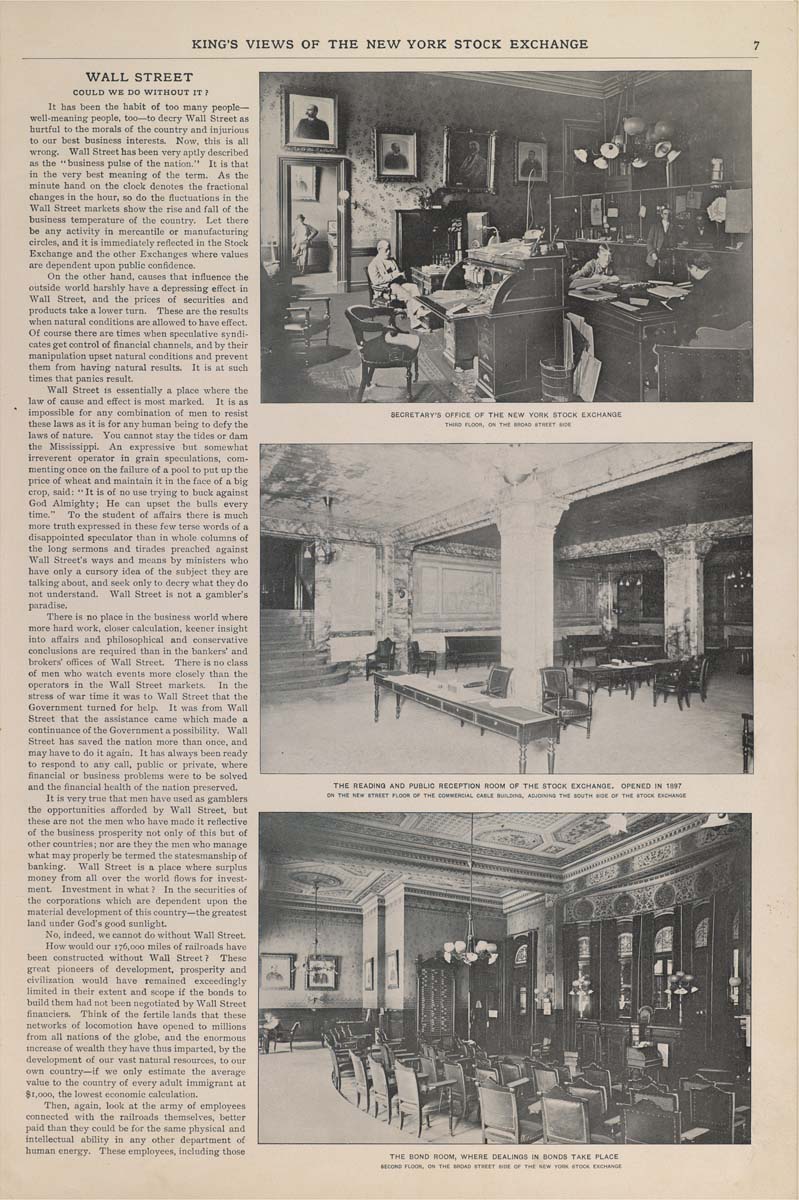KING'S VIEWS OF THE NEW YORK STOCK EXCHANGE
WALL STREET
COULD WE DO WITHOUT IT ?
It has been the habit of too many people—
well-meaning people, too—to decry Wall Street as
hurtful to the morals of the country and injurious
to our best business interests. Now, this is all
wrong. Wall Street has been very aptly described
as the "business pulse of the nation." It is that
in the very best meaning of the term. As the
minute hand on the clock denotes the fractional
changes in the hour, so do the fluctuations in the
Wall Street markets show the rise and fall of the
business temperature of the country. Let there
be any activity in mercantile or manufacturing
circles, and it is immediately reflected in the Stock
Exchange and the other Exchanges where values
are dependent upon public confidence.
On the other hand, causes that influence the
outside world harshly have a depressing effect in
Wall Street, and the prices of securities and
products take a lower turn. These are the results
when natural conditions are allowed to have effect.
Of course there are times when speculative syndi¬
cates get control of financial channels, and by their
manipulation upset natural conditions and prevent
them from having natural results. It is at such
times that panics result.
Wall Street is essentially a place where the
law of cause and effect is most marked. It is as
impossible for any combination of men to resist
these laws as it is for any human being to defy the
laws of nature. You cannot stay the tides or dam
the Mississippi. An expressive but somewhat
irreverent operator in grain speculations, com¬
menting once on the failure of a pool to put up the
price of wheat and maintain it in the face of a big
crop, said: " It is of no use trying to buck against
God Almighty; He can upset the bulls every
time." To the student of affairs there is much
more truth expressed in these few terse words of a
disappointed speculator than in whole columns of
the long sermons and tirades preached against
Wall Street's ways and means by ministers who
have only a cursory idea of the subject they are
talking about, and seek only to decry what they do
not understand. Wall Street is not a gambler's
paradise.
There is no place in the business world where
more hard work, closer calculation, keener insight
into affairs and philosophical and conservative
conclusions are required than in the bankers' and
brokers' offices of Wall Street. There is no class
of men who watch events more closely than the
operators in the Wall Street markets. In the
stress of war time it was to Wall Street that the
Government turned for help. It was from Wall
Street that the assistance came which made a
continuance of the Government a possibility. Wall
Street has saved the nation more than once, and
may have to do it again. It has always been ready
to respond to any call, public or private, where
financial or business problems were to be solved
and the financial health of the nation preserved.
It is very true that men have used as gamblers
the opportunities afforded by Wall Street, but
these are not the men who have made it reflective
of the business prosperity not only of this but of
other countries; nor are they the men who manage
what may properly be termed the statesmanship of
banking. Wall Street is a place where surplus
money from all over the world flows for invest¬
ment. Investment in what ? In the securities of
the corporations which are dependent upon the
material development of this country—the greatest
land under God's good sunlight.
No, indeed, we cannot do without Wall Street.
How would our 176,000 miles of railroads have
been constructed without Wall Street ? These
great pioneers of development, prosperity and
civilization would have remained exceedingly
limited in their extent and scope if the bonds to
build them had not been negotiated by Wall Street
financiers. Think of the fertile lands that these
networks of locomotion have opened to millions
from all nations of the globe, and the enormous
increase of wealth they have thus imparted, by the
development of our vast natural resources, to our
own country—if we only estimate the average
value to the country of every adult immigrant at
$1,000, the lowest economic calculation.
Then, again, look at the army of employees
connected with the railroads themselves, better
paid than they could be for the same physical and
intellectual ability in any other department of
human energy. These employees, including those
SECRETARY'S OFFICE OF THE NEW YORK STOCK EXCHANGE
THIRD FLOOR, ON THE BROAD STREET SIDE
THE READING AND PUBLIC RECEPTION ROOM OF THE STOCK EXCHANGE. OPE
ON THE NEW STREET FLOOR OF THE COMMERCIAL CABLE BUILDING, ADJOINING THE SOUTH SIDE OF THE
NED IN 1897
STOCK EXCHANGE
THE BOND ROOM, WHERE DEALINGS IN BONDS TAKE PLACE
SECOND FLOOR, ON THE BROAD STREET SIDE OF THE NEW YORK STOCK EXCHANGE
|








